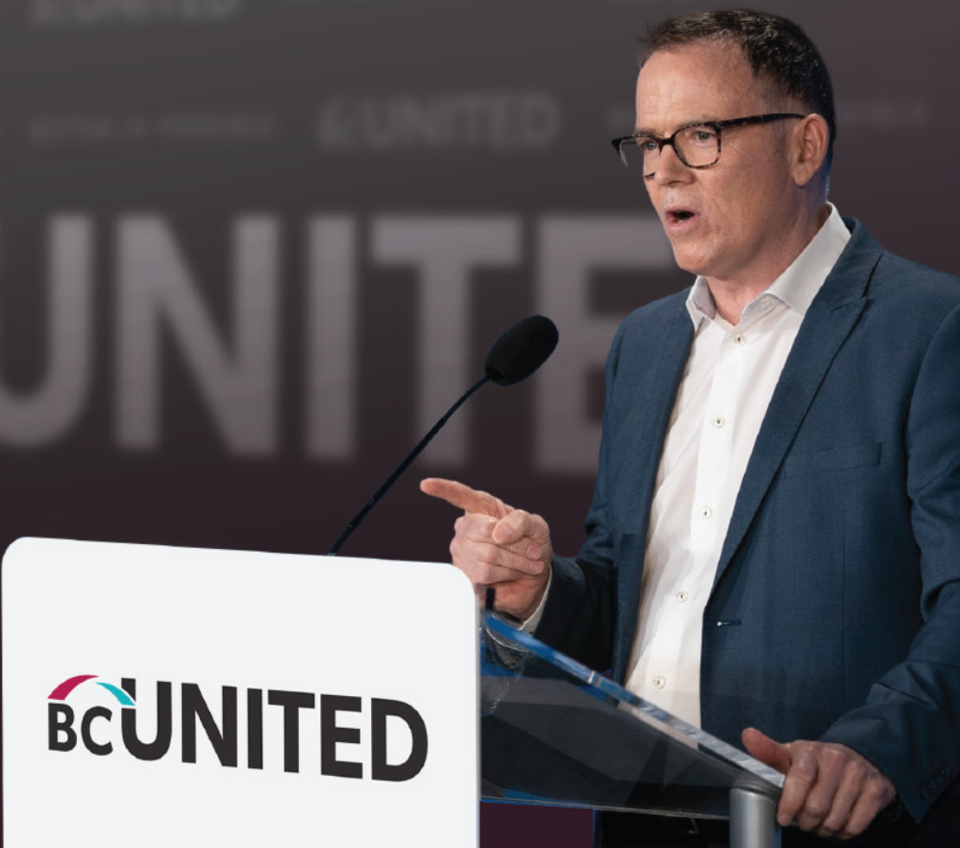Kevin Falcon re-entered provincial politics last year with a promise to shake up the BC Liberal party. That pledge came to fruition Wednesday as he unveiled the new name, logo and brand he intends to carry into the next election.
The party made the official switch to BC United on its social media and online presence. Its caucus and legislature names will switch when the house resumes Monday.
Falcon said the change symbolizes the revitalized focus he intends to present to voters in 2024.
“The fact we’ve got a new leader, we’ve got a new name, we’ve got a new logo, we’ve got new candidates, we’re raising more money than we’ve ever raised in opposition — you know, we’re building that momentum,” Falcon said in an interview.
“I think it’s important that we demonstrate to the public, we’re not just good in opposition but we’ve got great ideas and we’re excited about forming government so that we can actually get better results.”
BC Liberal members voted in November to change the party name after Falcon made it a centrepiece of his campaign for leader.
The new design took several months to develop. It has two stylized arches of pink and teal stretching over the initials B.C. and into the letter U of united. A shorted social media version of the name is “BCU.”
“You’ll see there’s sort of a couple of bridges coming together,” Falcon said of the arches.
“To me, that's very symbolic. It’s not just because we're builders, and we believe in building in infrastructure, but also the bridging of the different fabric that makes B.C. such a great place.
“We've got a very diverse community. We've got different ethnic backgrounds, socio-economic backgrounds, people with different cultural backgrounds, and all of that can come together.
“A bridge represents strength, and coming together represents the diversity, which is the strength of our province.”
The rebrand will mean voters won’t see the familiar BC NDP versus BC Liberals matchup in the next provincial election for the first time in almost 30 years. The party has declined to put both names on the ballot, scheduled for Oct. 19, 2024, instead choosing to go all-in on introducing the BC United brand to the public over the next 18 months.
“I’m not too worried about it,” Falcon said in an interview. “I think about my friend Ken Sim who ran for mayor of Vancouver under ABC. The name ABC didn’t exist a year ago, and they won a massive majority, upset all the traditional political parties and blew them right out of the water.”
Still, it’s one of the riskier moves in modern provincial political history.
Falcon is hoping the trade-off of abandoning a party name that voters elected into office four times over 16 years(from 2001 to 2017) will help revitalize a brand that voters most recently twice rejected in favour of the BC NDP. The party’s defeat in 2020 was by one of its largest margins ever.
Falcon is also hoping to distance himself from any voter confusion with the federal Liberal government of Prime Minister Justin Trudeau, which is currently engaged in a power-sharing deal with the federal NDP.
BC United’s new colours of pink and teal are subtle nods to the red Liberal and blue Conservative colours that long made up the so-called "free-enterprise" supporters of the centre-right side of the political spectrum, which has served as the party’s political bedrock.
That coalition has been under strain in recent elections. Falcon has positioned the party even further away from past right-wing fiscal and social policies to fight for centrist voter support in Metro Vancouver suburbs currently dominated by the NDP.
“I think the public is smart enough to say, ‘Hey, I get it, BC United, I know what they stand for, and I know what they are going after, and we’re prepared to support that kind of fresh change that’s focused on results,’” said Falcon.
However, the BC Conservative Party, now headed by former BC Liberal MLA John Rustad, remains a threat to ciphon right-wing votes away from Falcon’s coalition, whatever its name.
B.C.’s governing New Democrats also don’t intend to let the new BC United party slip quietly into the rebrand.
Premier David Eby has infused his speeches as of late with historical reminders of the previous Liberal government’s shortcomings on social spending, in an attempt to link past policy failures directly to Falcon’s time as a cabinet minister in the previous government.
The NDP’s hope is that the public unhappiness with the previous BC Liberal government naturally flows into the newly-minted BC United. Falcon, meanwhile, is looking for a clean start. Voters will ultimately decide who they believe next year.
Rob Shaw has spent more than 15 years covering B.C. politics, now reporting for CHEK News and writing for Glacier Media. He is the co-author of the national bestselling book A Matter of Confidence, host of the weekly podcast Political Capital, and a regular guest on CBC Radio.



